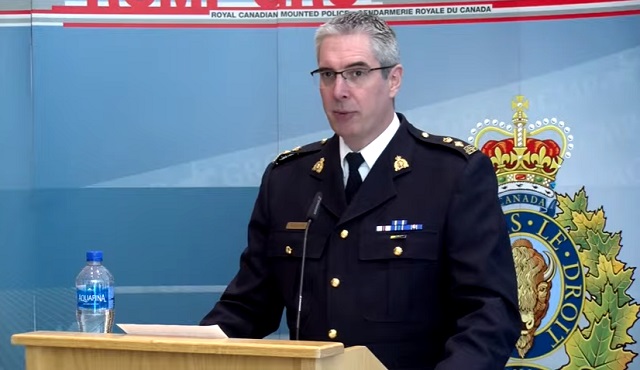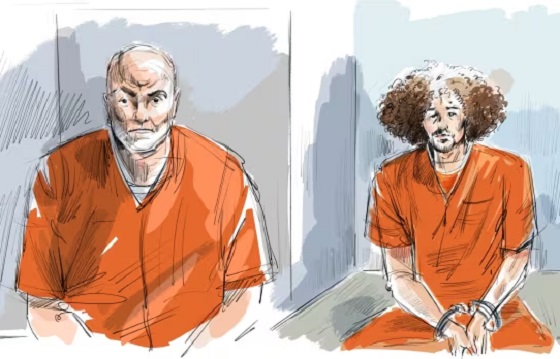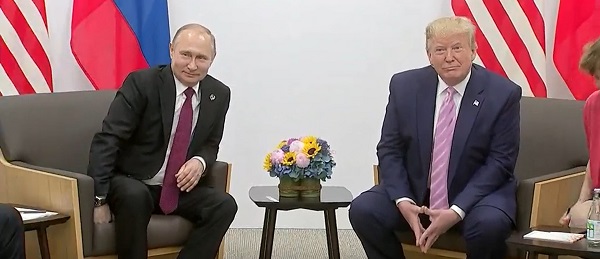Alberta
Alberta RCMP announce results of investigation into the 2017 UCP Leadership Vote

News release from the Alberta RCMP
Alberta RCMP concludes investigations surrounding the 2017 UCP Leadership Vote
In July 2017, the Wildrose Party and the Progressive Conservative Party merged to form the United Conservative Party (UCP). A UCP leadership contest followed, which was an internal UCP process with no oversight from Elections Alberta, except as it related to the Alberta Election Finances and Contributions Disclosure Act (EFCDA).
On Oct. 4, 2017, Jeff Callaway dropped out of the race and publicly endorsed Jason Kenney. On Oct. 28, 2017, Kenney was officially elected as the new UCP leader. Allegations of wrongdoing surfaced after the leadership contest. In February 2019, a complaint was received by the Alberta RCMP in relation to these allegations, which resulted in the RCMP opening an investigation into two separate allegations.
Allegation #1 – Jeff Callaway candidacy
One allegation was that Callaway entered the contest solely to attack another candidate, always with the intention of pulling out of the leadership race and endorsing a different candidate prior to the vote. Given the allegation that this candidate had portrayed himself as a legitimate candidate and, as a result, was able to solicit money from individuals who believed he was a legitimate candidate, fraud contrary to section 380 of the Criminal Code, was identified as the appropriate offence to be investigated:
- Investigators reviewed the candidate’s campaign debates and political advertisements used during the campaign. A review of the campaign’s financial records showed that, as a result, it was able to generate approximately $95,000 in financial contributions. Elections Alberta investigated Callaway’s campaign finances under the Alberta Election Finances and Contributions Disclosure Act. The results of Elections Alberta’s investigation are posted on their website.
- Alberta RCMP Investigators conducted more than 170 interviews with contributors and campaign staff, and examined over 25,000 related emails.
Outcome #1: The investigation did not uncover evidence to establish that Callaway, or any other person, committed a criminal offence.
Allegation #2 – Voter Fraud
In order to vote, a UCP member needed to register and receive a Personal Identification Number (PIN), either by phone call, email, or text message. Once the PIN was received, the member could then cast a vote by phone or by using a proprietary electronic voting platform on the internet.
The allegations were that emails were created in order to receive PINs and vote on peoples’ behalf without their consent or knowledge. Identity Fraud contrary to section 403 of the Criminal Code was identified as the appropriate offence to be investigated under the circumstances:
- The online platform used by the UCP to hold the leadership contest was identified and the RCMP obtained the voter database through a legal process, which contained data for more than 60,000 voters.
- The RCMP analysed the data and identified several suspicious cross-sections of voters where multiple votes were cast from the same phone number, or originated from the same IP address. Similar to an in-person ballot, the data did not show which candidate was voted for, only that a vote had been cast using that unique identifier.
- The RCMP generated a list of these “suspicious votes,” conducted interviews with the more than 1,200 individuals and examined their UCP membership and registration forms.
- To be clear, the number of potential votes at issue, which after investigation was less than 200, would not have impacted the leadership contest given that Jason Kenney won with 36,625 votes (61%), whereas Brian Jean received 18,336 votes (31%), followed by Doug Schweitzer with 4,273 votes (7%).The RCMP investigation did not find evidence that any leadership candidate encouraged their volunteers to engage in identity fraud.
- The service provider for the online voting platform used by the UCP was not compromised, and worked exactly as specified.
This high-profile investigation was extremely complex, and time consuming due to several factors:
- The sheer volume of data being analysed and investigated took a significant amount of time. Further, a portion of this data required that judicial authorizations be obtained both domestically and outside of Canada.
- The fact that the complaint was not received until 2019 impacted many witnesses’ recollections of the event. The 2017 UCP Leadership Contest occurred at the same time as other internal party votes. As a result, some witnesses were unclear about which process the RCMP were investigating.
- Even for cases that appear to be voter fraud, there can be innocent explanations. For example, it wasn’t illegal for one phone number or email to receive many PINs. It was also not illegal for many votes to be cast from the same IP address or phone number. In certain families living under the same roof, this was common. We also saw the same pattern in office buildings and at voting kiosks where many people voted from the same IP.
Outcome #2: While the Alberta RCMP determined that there were suspected instances of potential identity fraud, there was insufficient evidence to charge any suspect, again there was no evidence that any leadership candidate orchestrated these relatively rare instances.
The decision on whether or not to lay a charge in Alberta rests with the police. However, throughout this investigation, the RCMP did seek advice from Crown, which began in Alberta, but was later referred to the Ontario Ministry of the Attorney General who assigned Crown Prosecutors.
These Crown Prosecutors provided valuable and timely advice throughout our investigation and their assistance was greatly appreciated
It should be noted that these allegations of possible voter fraud occurred during an internal political party voting process, and in no way represents any possible fraud or shortcomings in our general provincial and federal elections.
Nothing in the investigation suggested that the UCP failed to take reasonable steps to manage their internal process. We hope that the information shared today will further reduce the risk of similar incidents occurring in the future for any political party.
The investigators received cooperation from the UCP and the leadership candidates which
assisted in moving the investigation forward.
“We would like to highlight that in investigating allegations of criminality, the thoroughness and completeness of the investigation is the standard that should be assessed and that the lack of criminal charges should not be the test of a successful investigation,” said Superintendent Rick Jané of the Alberta RCMP. “In this case, experienced criminal investigators tested these allegations. In the end, Albertans can be confident that a thorough investigation, independent of government, was conducted.”
Video of News Conference: https://www.youtube.com/@RCMPAlbertaGRC/streams
Key Statistics:
Investigators
- 65 Investigators
o 5 core investigators
o 60 additional investigators seconded for varying lengths of time
o 10 public service employees assisted in various capacities
Investigation
- 1,200 voter canvass interviews
- 563 structured interviews
o 226 hours of audio
o Conducted by two interviewers
o Totaling 420 person-hours worked
Translation
- Translation was required for Arabic, South Asian and Chinese languages
- Investigators were sourced from “K” Div Federal Policing; Auto-theft; Digital Forensic Services Units; as well as Airdrie, Canmore, Red Deer, Thorsby, High River, and Maskwacis RCMP Detachments to fulfill this need.
Financial
- $460,877 in overtime and travel expenses
o $356,288 in overtime
o $104,589 in travel expenses, with $38,647 in out-of-province expenses
Travel
- 12 out of province trips (BC, Ontario, Nova Scotia) involving 22 members
- There was no international travel
Documentation
(warrants, sealing orders, production orders, information to obtain, administration, mutual legal assistance requests)
- 7,484 PDF documents (totaling 69,922 pages)
- 20,625 digital files (totaling 54 GB of data)
Alberta
Median workers in Alberta could receive 72% more under Alberta Pension Plan compared to Canada Pension Plan

From the Fraser Institute
By Tegan Hill and Joel Emes
Moving from the CPP to a provincial pension plan would generate savings for Albertans in the form of lower contribution rates (which could be used to increase private retirement savings while receiving the same pension benefits as the CPP under the new provincial pension), finds a new study published today by the Fraser Institute, an independent, non-partisan Canadian public policy think-tank.
“Due to Alberta’s comparatively high rates of employment, higher average incomes, and younger population, Albertans would pay a lower contribution rate through a separate provincial pension plan while receiving the same benefits as under the CPP,” said Tegan Hill, director of Alberta policy at the Fraser Institute and co-author of Illustrating the Potential of an Alberta Pension Plan.
Assuming Albertans invested the savings from moving to a provincial pension plan into a private retirement account, and assuming a contribution rate of 5.85 per cent, workers earning the median income in Alberta ($53,061 in 2025) could accrue a stream of retirement payments totalling $454,741 (pre-tax)—a 71.6 per cent increase from their stream of CPP payments ($264,968).
Put differently, under the CPP, a median worker receives a total of $264,968 in retirement income over their life. If an Alberta worker saved the difference between what they pay now into the CPP and what they would pay into a new provincial plan, the income they would receive in retirement increases. If the contribution rate for the new provincial plan was 5.85 per cent—the lower of the available estimates—the increase in retirement income would total $189,773 (or an increase of 71.6 per cent).
If the contribution rate for a new Alberta pension plan was 8.21 per cent—the higher of the available estimates—a median Alberta worker would still receive an additional $64,672 in retirement income over their life, a marked increase of 24.4 per cent compared to the CPP alone.
Put differently, assuming a contribution rate of 8.21 per cent, Albertan workers earning the median income could accrue a stream of retirement payments totaling $329,640 (pre-tax) under a provincial pension plan—a 24.4 per cent increase from their stream of CPP payments.
“While the full costs and benefits of a provincial pension plan must be considered, its clear that Albertans could benefit from higher retirement payments under a provincial pension plan, compared to the CPP,” Hill said.
Illustrating the Potential of an Alberta Pension Plan
- Due to Alberta’s comparatively high rates of employment, higher average incomes, and younger population, Albertans would pay a lower contribution rate with a separate provincial pension plan, compared with the CPP, while receiving the same benefits as under the CPP.
- Put differently, moving from the CPP to a provincial pension plan would generate savings for Albertans, which could be used to increase private retirement income. This essay assesses the potential savings for Albertans of moving to a provincial pension plan. It also estimates an Albertan’s potential increase in total retirement income, if those savings were invested in a private account.
- Depending on the contribution rate used for an Alberta pension plan (APP), ranging from 5.85 to 8.2 percent, an individual earning the CPP’s yearly maximum pensionable earnings ($71,300 in 2025), would accrue a stream of retirement payments under the total APP (APP plus private retirement savings), yielding a total retirement income of between $429,524 and $584,235. This would be 22.9 to 67.1 percent higher, respectively, than their stream of CPP payments ($349,545).
- An individual earning the median income in Alberta ($53,061 in 2025), would accrue a stream of retirement payments under the total APP (APP plus private retirement savings), yielding a total retirement income of between $329,640 and $454,741, which is between 24.4 percent to 71.6 percent higher, respectively, than their stream of CPP payments ($264,968).

Joel Emes
Alberta
Alberta ban on men in women’s sports doesn’t apply to athletes from other provinces

From LifeSiteNews
Alberta’s Fairness and Safety in Sport Act bans transgender males from women’s sports within the province but cannot regulate out-of-province transgender athletes.
Alberta’s ban on gender-confused males competing in women’s sports will not apply to out-of-province athletes.
In an interview posted July 12 by the Canadian Press, Alberta Tourism and Sport Minister Andrew Boitchenko revealed that Alberta does not have the jurisdiction to regulate out-of-province, gender-confused males from competing against female athletes.
“We don’t have authority to regulate athletes from different jurisdictions,” he said in an interview.
Ministry spokeswoman Vanessa Gomez further explained that while Alberta passed legislation to protect women within their province, outside sporting organizations are bound by federal or international guidelines.
As a result, Albertan female athletes will be spared from competing against men during provincial competition but must face male competitors during inter-provincial events.
In December, Alberta passed the Fairness and Safety in Sport Act to prevent biological men who claim to be women from competing in women’s sports. The legislation will take effect on September 1 and will apply to all school boards, universities, as well as provincial sports organizations.
The move comes after studies have repeatedly revealed what almost everyone already knew was true, namely, that males have a considerable advantage over women in athletics.
Indeed, a recent study published in Sports Medicine found that a year of “transgender” hormone drugs results in “very modest changes” in the inherent strength advantages of men.
Additionally, male athletes competing in women’s sports are known to be violent, especially toward female athletes who oppose their dominance in women’s sports.
Last August, Albertan male powerlifter “Anne” Andres was suspended for six months after a slew of death threats and harassments against his female competitors.
In February, Andres ranted about why men should be able to compete in women’s competitions, calling for “the Ontario lifter” who opposes this, apparently referring to powerlifter April Hutchinson, to “die painfully.”
Interestingly, while Andres was suspended for six months for issuing death threats, Hutchinson was suspended for two years after publicly condemning him for stealing victories from women and then mocking his female competitors on social media. Her suspension was later reduced to a year.
-

 Opinion1 day ago
Opinion1 day agoPreston Manning: Three Wise Men from the East, Again
-

 Addictions1 day ago
Addictions1 day agoWhy B.C.’s new witnessed dosing guidelines are built to fail
-

 Business1 day ago
Business1 day agoMark Carney’s Fiscal Fantasy Will Bankrupt Canada
-

 Uncategorized2 days ago
Uncategorized2 days agoCNN’s Shock Climate Polling Data Reinforces Trump’s Energy Agenda
-

 National12 hours ago
National12 hours agoCanada’s immigration office admits it failed to check suspected terrorists’ background
-

 conflict12 hours ago
conflict12 hours agoTrump’s done waiting: 50-day ultimatum for Putin to end Ukraine war
-

 Business1 day ago
Business1 day agoCarney Liberals quietly award Pfizer, Moderna nearly $400 million for new COVID shot contracts
-

 COVID-1924 hours ago
COVID-1924 hours agoTrump DOJ dismisses charges against doctor who issued fake COVID passports







